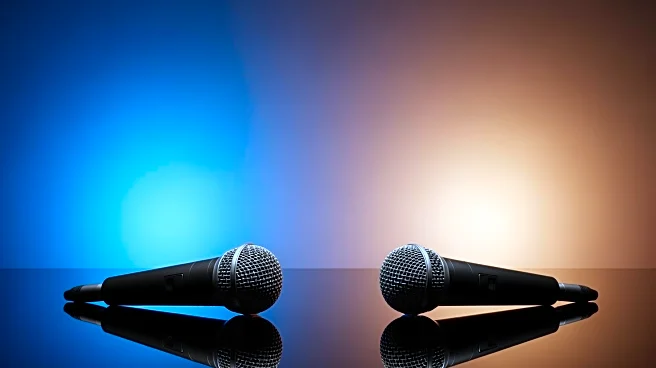What's Happening?
The Morning Show, a popular series on Apple TV+, has become known for its chaotic and melodramatic storytelling, incorporating real-life events such as the Ukraine war and the repealing of Roe v Wade. The show, which first aired in November 2019, initially struck a chord with viewers by addressing the #MeToo movement and other current affairs. Over its three seasons, the series has taken increasingly wild narrative leaps, including characters live-streaming during Covid, engaging in space travel, and participating in the Capitol insurrection. Despite criticism from media outlets like The Guardian and Vulture, the show has maintained a strong viewership, growing by 20% between its second and third seasons.
Why It's Important?
The Morning Show's ability to maintain high viewership despite its outlandish plots highlights the audience's appetite for dramatic and unpredictable storytelling. This trend reflects a broader shift in entertainment consumption, where viewers are drawn to content that offers escapism and engages with real-world issues in a sensational manner. The show's success underscores the importance of streaming platforms like Apple TV+ in shaping modern television narratives and influencing viewer preferences. It also demonstrates the potential for series to tackle complex social issues while maintaining entertainment value, impacting how future shows might approach similar themes.
What's Next?
As The Morning Show continues to captivate audiences, it may inspire other television series to adopt similar narrative strategies, blending real-world events with dramatic fiction. The show's producers might explore even more daring plotlines in future seasons to keep viewers engaged. Additionally, the success of The Morning Show could encourage streaming platforms to invest in high-budget productions that push creative boundaries, potentially leading to a new era of television where traditional storytelling norms are challenged.
Beyond the Headlines
The Morning Show's approach to storytelling raises questions about the ethical implications of dramatizing real-world events for entertainment purposes. While the series provides a platform for discussing important social issues, it also risks trivializing them through sensationalism. This balance between entertainment and social commentary may influence how audiences perceive and engage with real-world events, potentially affecting public discourse and awareness.








